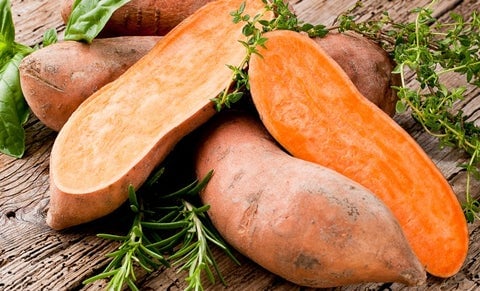Sweet Potato Nutrition
The onset of Fall means an abundance of one of the best, most versatile food groups – root vegetables! And none are quite as delicious, nutritious, or easy to cook with as sweet potato. Its soft, rich, orange flesh is perfect for soups and stews, baked whole, or cut into wedges and roasted in the oven, and it’s one of the healthiest vegetable you can eat.
In season from October to December, the sweet potato is a member of the bindweed family, Convolvulaceae. Across the US, they are often referred to as yams even though they are entirely unrelated to true yams (which are a completely different species). Sweet potatoes are also not closely related to the common potato (Solanum tuberosum).
Native to Central and South America, they have been cultivated in the region for over 5,000 years, particularly the Yucatán Peninsula in Mexico, and while they come in both yellow and purple varieties, it’s the orange version that Americans know and love. And with good reason, for it’s something of a superfood and is perfect as one of your five-a-day.

For starters, it’s an unsurpassed source of beta-carotene, a compound that’s a powerful antioxidant and one that the body converts into vitamin A. For this reason, one medium-sized sweet potato can provide up to 214% of your Recommended Daily Intake (RDI) of the vitamin, which is essential for boosting the immune system, growth, and helping maintain healthy eyesight.
Sweet potatoes are also packed with fibre (6.6 grams), carbs (41.4 grams), and contain a decent amount of protein (4 grams). All that fibre – they contain both soluble and insoluble – promotes gut health, and have been linked to a lower risk of colon cancer.
And while they have a relatively high starch content – they have a glycemic index (GI) rating of medium - sweet potatoes can potentially improve blood sugar regulation, even for those with type 2 diabetes. This is because all that fibre helps steady the pace of digestion and increases the level of adiponectin in the blood, a protein hormone that serves as an important modifier of insulin metabolism.

With 43% of your RDI of manganese, and 20% of your RDI of potassium, sweet potatoes can help lower blood pressure and reduce the risk of strokes – research has shown that potassium-rich diets help support heart health. There are plenty of other vitamins and minerals in them too – 52% of your RDI of vitamin C, 34% of your RDI of vitamin B6, which promotes brain health and helps the body turn food into energy, and 36% of your RDI of copper, essential for the production of red blood cells and maintaining healthy bones and blood vessels.
At just 180 calories, and low in salt, one sweet potato is a great addition to your daily diet, whether as a side dish, baked whole as a quick and easy lunch, or chopped up and added to a one-pot dish. At Buffalo Market, we carry organic sweet potatoes sourced locally, as well as a range of products that incorporate these orange orbs of goodness. Stick some in your cart today, and feel the health benefits of this amazing vegetable for yourself.

